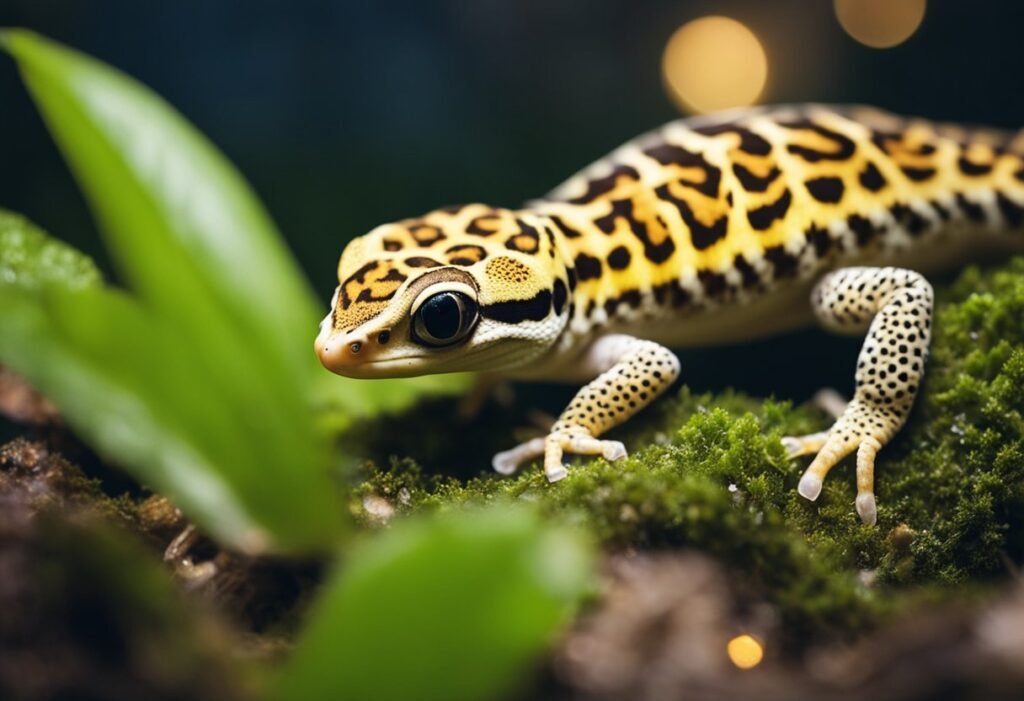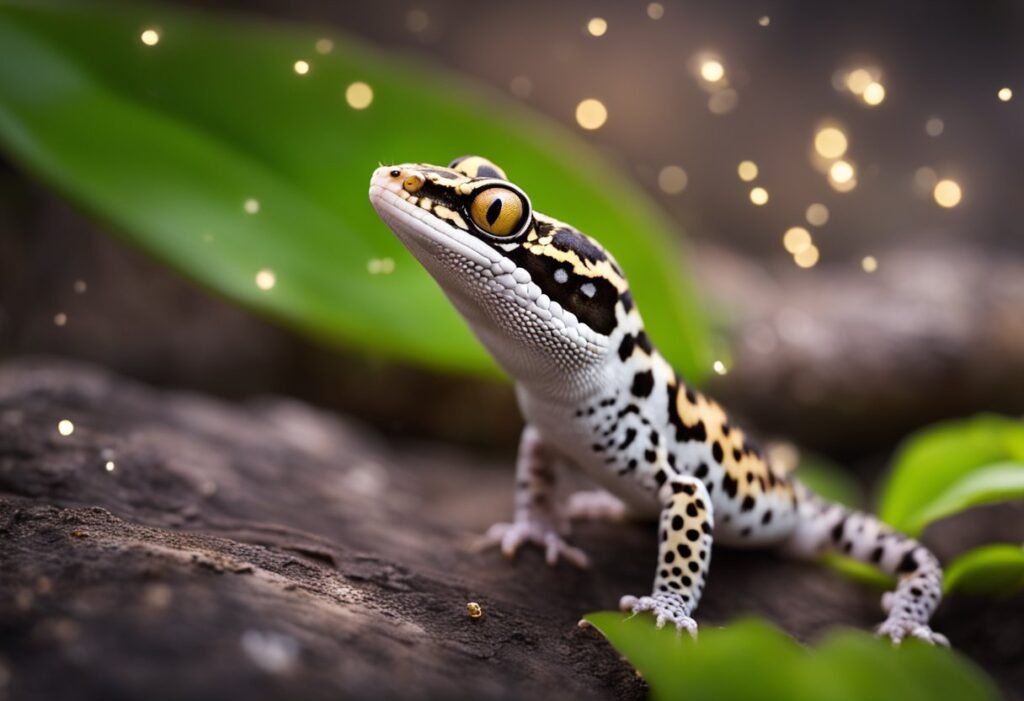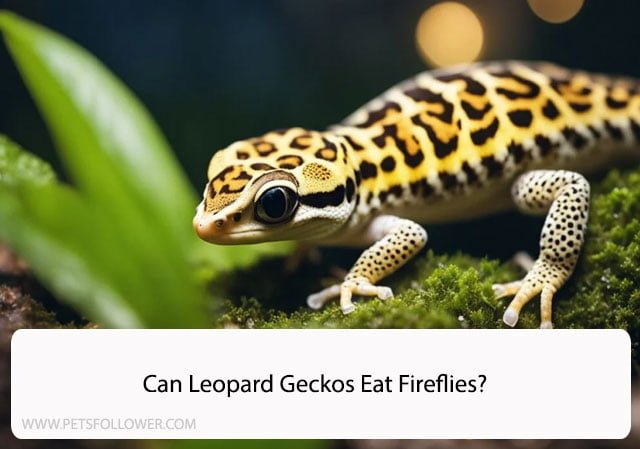Leopard geckos are fascinating creatures that make wonderful pets. As with any pet, it is important to provide them with a proper diet to ensure their health and well-being. One question that often arises is whether or not leopard geckos can eat fireflies.
Fireflies, also known as lightning bugs, are a common sight in many parts of the world. They are known for their bioluminescence, which makes them a popular insect to catch and observe. However, when it comes to feeding them to leopard geckos, there is some debate.
In this article, we will explore the question of whether or not leopard geckos can eat fireflies. We will examine the nutritional value of fireflies, as well as any potential risks associated with feeding them to leopard geckos. By the end of this article, you should have a better understanding of whether or not fireflies are a suitable food source for your leopard gecko.
Dietary Habits of Leopard Geckos

Natural Prey
Leopard geckos are insectivores, which means they feed on insects. In the wild, they hunt for insects such as crickets, mealworms, and waxworms. They are also known to feed on other small invertebrates such as spiders, scorpions, and beetles.
It is important to note that leopard geckos should only be fed insects that are safe for them to eat. Some insects, such as fireflies, are toxic to leopard geckos and can cause serious health problems or even death.
Nutritional Needs
Leopard geckos require a balanced diet that provides them with the necessary nutrients and vitamins. Insects such as crickets and mealworms are a good source of protein for leopard geckos.
It is essential to gut-load the insects before feeding them to the leopard geckos. Gut-loading involves feeding the insects with nutritious food before feeding them to the leopard geckos. This ensures that the leopard geckos receive the necessary vitamins and minerals from their food.
In addition to gut-loading, leopard geckos also require a source of calcium. Calcium is necessary for healthy bone growth and to prevent metabolic bone disease. Leopard geckos can be given calcium supplements in the form of powder or liquid.
Overall, leopard geckos have specific dietary needs that must be met to ensure their health and well-being. Providing them with a balanced diet of safe insects, gut-loaded with nutritious food, and supplemented with calcium, will help keep them healthy and happy.
Risks of Fireflies to Leopard Geckos

Leopard geckos are known for their diverse diet, and many owners may be tempted to offer them fireflies as a treat. However, it is important to understand the potential risks associated with feeding fireflies to leopard geckos.
Toxicity of Fireflies
Fireflies contain toxins called lucibufagins, which are harmful to many animals, including leopard geckos. These toxins can cause a variety of symptoms, including vomiting, seizures, and even death. Ingesting just one firefly can be enough to cause serious harm to a leopard gecko.
Lucibufagins Chemical Defense
Lucibufagins are a type of steroid that fireflies use as a chemical defense against predators. When threatened, fireflies will release these toxins, which can be harmful to animals that try to eat them. Leopard geckos, like many other animals, are not adapted to deal with these toxins and can suffer serious consequences if they ingest them.
In conclusion, it is not recommended to feed fireflies to leopard geckos due to the potential risks associated with their toxicity. It is important to provide a balanced and varied diet that meets the nutritional needs of leopard geckos without exposing them to unnecessary harm.
Safe Feeding Practices

When it comes to feeding leopard geckos, it is important to follow safe feeding practices to ensure their health and well-being. In this section, we will discuss the recommended insect diet for leopard geckos as well as the feeding frequency and amount.
Recommended Insect Diet
Leopard geckos are insectivores, which means they primarily eat insects. However, not all insects are safe for them to consume. It is important to avoid feeding leopard geckos insects that are toxic or hard to digest. Fireflies, for example, are not recommended for leopard geckos as they contain a toxic chemical called lucibufagins that can be harmful to their health.
Instead, we recommend feeding leopard geckos a diet of gut-loaded crickets, mealworms, waxworms, and superworms. These insects are high in protein and essential nutrients that leopard geckos need to maintain their health. It is important to gut-load these insects before feeding them to your leopard gecko. This means feeding them a nutritious diet for at least 24 hours before offering them to your gecko.
Feeding Frequency and Amount
Leopard geckos should be fed every two to three days. The amount of food you feed them will depend on their age and size. Younger geckos will require more frequent feedings and smaller amounts of food, while adult geckos can be fed larger meals less frequently.
As a general rule, you should offer your leopard gecko as many insects as they can eat in 10-15 minutes. Any uneaten insects should be removed from the enclosure to prevent them from hiding and potentially biting your gecko.
In summary, feeding leopard geckos a diet of gut-loaded crickets, mealworms, waxworms, and superworms is recommended. Fireflies and other toxic insects should be avoided. Feeding frequency and amount will vary based on the gecko’s age and size. By following these safe feeding practices, you can help ensure your leopard gecko stays healthy and happy.
Alternatives to Fireflies
If you’re considering feeding your leopard gecko fireflies, it’s important to note that they are not a safe option. Fireflies contain a toxin called lucibufagins, which can be harmful or even fatal to your gecko. Fortunately, there are many safe and nutritious alternatives to fireflies that you can offer your pet.
Commercially Available Feeder Insects
There are many commercially available feeder insects that are safe and nutritious for leopard geckos. Some of the most popular options include:
- Crickets: Crickets are a staple food for many reptiles, including leopard geckos. They are high in protein and easy to find at pet stores.
- Mealworms: Mealworms are another common feeder insect for leopard geckos. They are high in protein and fat, making them a good option for growing geckos.
- Dubia Roaches: Dubia roaches are becoming increasingly popular as a feeder insect for reptiles. They are high in protein and low in fat, making them a good option for adult geckos.
Cultivating Safe Prey at Home
If you’re interested in cultivating your own feeder insects at home, there are a few options that are safe for leopard geckos. These include:
- Crickets: Crickets are easy to breed at home and require little maintenance. However, they can be noisy and smelly, so they may not be ideal for everyone.
- Mealworms: Mealworms are also easy to breed at home and require minimal maintenance. They are a good option for geckos of all ages.
- Dubia Roaches: Dubia roaches can be a bit more challenging to breed at home, but they are a great option for geckos that need a high protein diet.
Overall, there are many safe and nutritious alternatives to fireflies that you can offer your leopard gecko. By choosing the right feeder insects, you can ensure that your gecko stays healthy and happy.
Recognizing and Responding to Poisoning
Symptoms of Toxicity
Leopard geckos are prone to poisoning if they consume fireflies. The toxins present in fireflies can cause severe harm to their health. As responsible pet owners, it is important to recognize the symptoms of toxicity in leopard geckos.
Some of the common symptoms of toxicity include lethargy, loss of appetite, vomiting, diarrhea, and tremors. In severe cases, the gecko may experience seizures or even death. It is important to note that the symptoms may vary depending on the amount of toxin ingested and the health of the gecko.
Immediate Actions and Veterinary Care
If you suspect that your leopard gecko has consumed fireflies, it is important to take immediate action. The first step is to remove any remaining fireflies from their enclosure to prevent further ingestion.
Next, it is essential to provide your gecko with fresh water to help flush out any toxins from their system. You may also consider offering a small amount of activated charcoal to help absorb any remaining toxins.
It is crucial to seek veterinary care immediately if you notice any symptoms of toxicity. A veterinarian can provide supportive care and treatment to help your gecko recover from poisoning.
In conclusion, recognizing and responding to poisoning in leopard geckos is crucial for their health and well-being. By taking immediate action and seeking veterinary care, we can help ensure that our pets receive the necessary treatment and support they need to recover from toxicity.
Habitat Considerations
When keeping leopard geckos as pets, it is important to provide them with a safe and suitable habitat. In this section, we will discuss some important considerations to keep in mind when creating an enclosure for your leopard gecko.
Enclosure Safety
Leopard geckos are known to be escape artists, so it is important to ensure that their enclosure is secure. We recommend using a tank with a secure lid or a custom-built enclosure with secure doors. It is also important to ensure that the enclosure is free from any sharp edges or objects that could harm your gecko.
Additionally, it is important to choose appropriate substrate for your gecko’s enclosure. Avoid using loose substrates such as sand or gravel, as these can cause impaction if ingested. Instead, opt for substrate options such as reptile carpet, paper towels, or tile.
Preventing Accidental Ingestion
Leopard geckos are opportunistic feeders, meaning they may attempt to eat anything that looks like food. As such, it is important to ensure that their enclosure is free from any potential hazards, such as fireflies.
Fireflies contain toxins that can be harmful or even deadly to leopard geckos if ingested. As such, it is important to never feed your leopard gecko fireflies or allow them access to areas where fireflies may be present.
In conclusion, providing a safe and suitable habitat for your leopard gecko is crucial for their health and well-being. By following these habitat considerations, you can help ensure that your gecko stays happy and healthy for years to come.
Frequently Asked Questions
Are fireflies safe as a food source for leopard geckos?
Fireflies, also known as lightning bugs, should not be fed to leopard geckos. They contain a toxic chemical called lucibufagins, which can be harmful to the gecko’s health. Ingesting even a small amount of this chemical can cause serious health issues, including seizures and death.
What insects should be avoided in a leopard gecko’s diet?
Leopard geckos should not be fed insects that are high in fat, such as mealworms and superworms, as this can lead to obesity and other health problems. Insects that are too large or too hard to digest, such as beetles and cockroaches, should also be avoided.
Can consuming certain bugs be harmful to leopard geckos?
Yes, certain bugs can be harmful to leopard geckos if they contain toxins or are difficult to digest. It is important to research the insects you plan to feed your gecko and ensure they are safe and appropriate for their diet.
What are the dietary risks of feeding wild-caught insects to leopard geckos?
Wild-caught insects can carry parasites and diseases that can be harmful to leopard geckos. It is recommended to only feed captive-bred insects that have been raised in a clean and controlled environment.
Which common backyard insects are toxic to leopard geckos?
Common backyard insects such as fireflies, centipedes, and spiders should be avoided as they can be toxic to leopard geckos. Additionally, insects that have been exposed to pesticides or other chemicals should not be fed to geckos.
How can the ingestion of certain bugs affect a leopard gecko’s health?
Ingesting certain bugs can cause health problems for leopard geckos, including digestive issues, impaction, and toxicity. It is important to provide a varied and balanced diet for your gecko to ensure their health and well-being.





